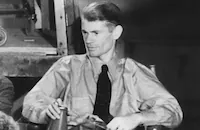By Candlelight
Brief Synopsis
Cast & Crew
James Whale
Elissa Landi
Paul Lukas
Nils Asther
Esther Ralston
Lawrence Grant
Film Details
Technical Specs

Synopsis
Josef, the butler to Prince Alfred von Rommer, aids the prince in his seductions and studies his techniques carefully, along with the memoirs of Casanova. One of the prince's favorite tactics is for Josef to turn off the lights, pretending the electricity has failed, in order to allow lovemaking to continue in the softer light of candles. The prince's affair with another man's wife sends the prince from Vienna to Monte Carlo. Josef precedes him to open the villa there. On the train, he meets Marie, who has every appearance of being a lady, except occasionally when her speech reveals a certain casualness if she is not careful. Marie mistakes Josef for the prince because of the royal crest on his luggage. They flirt on the train, but Marie runs away before Josef can discover where she lives. One night, when the prince announces that he will be out for the evening, Josef telephones everywhere until he finds Marie and she agrees to meet him at the villa. Josef is just about to practice some of the prince's lines on her when unexpectedly the prince returns. Playing along with the masquerade, the prince pretends to be the butler, much to Josef's consternation. The prince realizes that Marie is not the lady she pretends to be, but before Josef, whom she believes to be the prince, discovers her secret, she runs away, leaving behind a high-heeled shoe. Marie is actually a maid at the house of the Count and Countess von Rischenheim. By accident, she has walked off with the prince's cigarette case in her bag, which actually belongs to the countess. When he finds it, the count immediately suspects his wife of having an affair with the prince. Marie returns to the villa to find the missing shoe. While she is there, Josef asks her to return the cigarette case, and Marie admits that it is gone. Then the count arrives with the case in hand, demanding to see the prince, and Marie's disguise is penetrated. Joseph confesses that he is only the butler. When the prince and the countess arrive at the villa, Marie runs away again, but she soon returns and promises to marry Josef.

Cast

Elissa Landi

Paul Lukas

Nils Asther

Esther Ralston

Lawrence Grant

Dorothy Revier
Warburton Gamble
Lois January
Crew
David Berg
Julius Bernheim
Ruth Cummings
Karen De Wolf
Charles D. Hall
W. Franke Harling
F. Hugh Herbert
Ted Kent
Hans Kraly
Gilbert Kurland
Carl Laemmle Jr.
Carl Laemmle
John J. Mescall
Maurice Pivar

Film Details
Technical Specs

Quotes
Trivia
Notes
According to Motion Picture Herald and the copyright registration, David Berg was the editor. He is not credited on the film, however. News items in Film Daily note that Adolphe Menjou agreed to play a role in the film and Universal wanted Joan Bennett to play opposite him. News items in Hollywood Reporter indicate that both Laurence Olivier and John Boles were considered for the lead. James Whale replaced Robert Wyler, who took a short vacation for his health after the film had been in production for about ten days. The P. G. Wodehouse adaptation of Siegfried Geyer's play was presented on television on Broadway Television Theatre on February 16, 1953, Kraft Theatre on December 31, 1953 and on Pond's Theatre on May 5, 1955.













